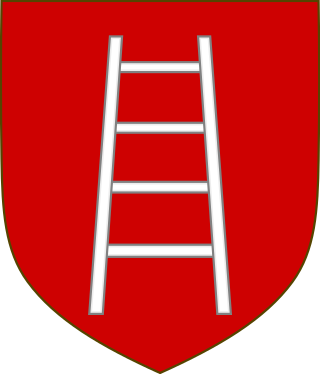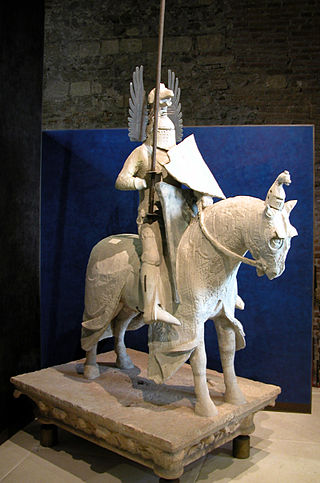
Verona is a city on the River Adige in Veneto, Italy, with 258,031 inhabitants. It is one of the seven provincial capitals of the region, and is the largest city municipality in the region and in northeastern Italy. The metropolitan area of Verona covers an area of 1,426 km2 (550.58 sq mi) and has a population of 714,310 inhabitants. It is one of the main tourist destinations in Northern Italy because of its artistic heritage and several annual fairs and shows as well as the opera season in the Arena, an ancient Roman amphitheater.

The House of Della Scala, whose members were known as Scaligeri or Scaligers, was the ruling family of Verona and mainland Veneto from 1262 to 1387, for a total of 125 years.

Cangrandedella Scala was an Italian nobleman, belonging to the della Scala family that ruled Verona from 1308 until 1387. He was indeed one of the most important characters at the time of signorie during the period where italy divided in comuni. Now perhaps best known as the leading patron of the poet Dante Alighieri and featuring prominently in Giovanni Boccaccio's almost contemporary Decameron, Cangrande was in his own day chiefly acclaimed as a successful warrior and autocrat. Between becoming sole ruler of Verona in 1311 and his death in 1329 he took control of several neighbouring cities, notably Vicenza, Padua and Treviso, and came to be regarded as the leader of the Ghibelline faction in northern Italy.

The history of Verona traces its origins from the foundation of the first settlement on San Pietro hill, probably dating back to the Neolithic period, to the present day: the evidence of such an ancient and rich history can be seen in the landmarks, in the streets and squares, even underground, where the ruins and artifacts of ancient prehistoric and particularly Roman civilizations emerge. It was especially during Roman rule that Verona prospered to become one of the most important cities in northern Italy, a status it maintained even after the fall of the Roman Empire, when the city was repeatedly elevated to capital of Roman-Barbarian kingdoms.

Mastino I della Scala, born Leonardo or Leonardino, was an Italian aristocrat who founded the Scaliger house of the Lords of Verona.

Mastino II della Scala was lord of Verona. He was a member of the famous Scaliger family of Northern Italy.

Giovanni Visconti (1290–1354) was an Italian Roman Catholic cardinal, who was co-ruler in Milan and lord of other Italian cities. He also was a military leader who fought against Florence, and used force to capture and hold other cities.

Niccolò II d'Este was lord of Ferrara, Modena and Parma from 1361 until his death.

Ubertino Ida Carrara, called Novello and better known as Ubertinello, was the Lord of Padua from 1338 until his death.

Cansignorio della Scala was Lord of Verona from 1359 until 1375, initially together with his brother Paolo Alboino.

Cangrande II della Scala was Lord of Verona from 1351 until his death.

Alboino I della Scala was the Scaliger Lord of Verona from 1304 until his death.

The Scaliger Tombs is a group of five Gothic funerary monuments in Verona, Italy, celebrating the Scaliger family, who ruled in Verona from the 13th to the late 14th century.

Alberto II della Scala was lord of Verona from 1329 until his death. He was a member of the famous Scaliger family of northern Italy.

Bartolomeo I della Scala was lord of Verona from 1301, a member of the Scaliger family and protector of Dante during his exile from Florence.

Beatrice Regina della Scala was Lady of Milan by marriage to Bernabò Visconti, Lord of Milan, and politically active as the adviser of her spouse.

The House of Bonacolsi was the name of an Italian noble family which ruled Mantua in the last quarter of the 13th century and the first quarter of the 14th. The Bonacolsi were the first lords of Mantua, preceding and creating the basis for the much more famous House of Gonzaga.

Gigliola da Carrara (1379–1416) was the Marchioness of Ferrara, daughter of Francesco Novello da Carrara, lord of Padua, son of Francesco I da Carrara, and Taddea d'Este.

Ludovico I Gonzaga was an Italian lord, the founder of the Gonzaga family who was the first capitano del popolo of Mantua and imperial vicar.

The Scaliger War was a conflict fought in 1336–1339 between the Scaliger lords of Verona, Mastino II della Scala and Alberto II della Scala, who had built an extensive territorial state in northern Italy, and a coalition of powers threatened by Scaliger expansion. These were chiefly the Republic of Venice, antagonized by the imposition of taxes on overland trade and the Scaligers' threat to end Venetian salt monopoly, and the Republic of Florence, which resented the Scaliger annexation of Lucca, that Florence had claimed for itself. After the first victories of the anti-Scaliger coalition, it was joined by Milan, Mantua, and Ferrara, who all had reasons to fear Scaliger ambitions. The turning point of the war was the end of Scaliger dominion over Padua in 1337, which became a separate, Venetian-influenced lordship under Marsilio da Carrara. The peace treaty, concluded at Venice on 24 January 1339, deprived Mastino II of most of his recent gains, reducing Scaliger domains to Verona and Vicenza. The annexation of Mestre and Treviso to Venice, however, marked the beginnings of the Venetian mainland state.

















